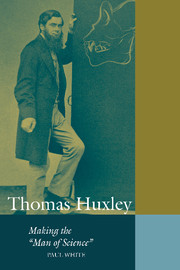Book contents
- Frontmatter
- Contents
- Illustrations
- Acknowledgments
- Introduction
- 1 Science at Home
- 2 Gentlemen of Science? Debates over Manners and Institutions
- 3 Science as Culture
- 4 The Worship of Science
- 5 “Darkest England”: Science and Labor in the 1880s and 1890s
- Conclusion: The End of the “Man of Science”
- Bibliography
- Index
- References
- Frontmatter
- Contents
- Illustrations
- Acknowledgments
- Introduction
- 1 Science at Home
- 2 Gentlemen of Science? Debates over Manners and Institutions
- 3 Science as Culture
- 4 The Worship of Science
- 5 “Darkest England”: Science and Labor in the 1880s and 1890s
- Conclusion: The End of the “Man of Science”
- Bibliography
- Index
- References
Summary

- Type
- Chapter
- Information
- Thomas HuxleyMaking the 'Man of Science', pp. 175 - 198Publisher: Cambridge University PressPrint publication year: 2002



